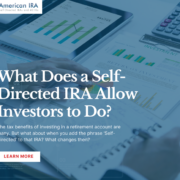What is the Difference Between a Self-Directed IRA Custodian and a Brokerage?
Increasingly in years past, the Self-Directed IRA has gained prominence. You might not have heard of a Self-Directed IRA just five years ago, but with more and more people working in the gig economy, working freelance, or even starting businesses, the Self-Directed IRA has become a hot topic amongst investors. But given just how popular these have become, why haven’t more brokerages offered Self-Directed IRAs? Is it really so complicated to let investors choose their own investments?
To understand the differences between Self-Directed IRA custodians and brokerages, we’ll have to look at what each of them is first. Then we’ll point out the specific differences that will help you make better decisions for your own financial future.
What Does a Self-Directed IRA Custodian Do?
A Self-Directed IRA custodian might be better defined by what they don’t do: they don’t sell investments. And because they don’t sell investments, such as stock funds, they’re not going to look to limit your investment options to a select group of stock funds. That’s why self-directing with a Self-Directed IRA can give you much more leeway and freedom. You’ll be free to choose which investments you make. For many investors, that means expanding to all sorts of potential investment asset classes, such as real estate, precious metals, and private companies. There’s even an arrangement known as a “Checkbook IRA” in which you own an LLC within an IRA, using that LLC’s checkbook to make fast investment decisions.
The Self-Directed IRA custodian’s role in this situation is to administer the account, but not make decisions for you. Your paperwork may go through the custodian, but the ultimate power of what ends up in the account is in your hands. For that reason, it’s a role that provides you with a lot of the responsibility for handling tax reporting and retirement regulation adherence.
What Does a Brokerage Do?
A brokerage offers investments, often making money off of the products it sells. Even popular brokerages like Vanguard, offering very low-fee financial products such as index funds, do ultimately take fees—they have to earn their money somehow. This means that when you work through a brokerage, they may be more likely to have you choose from a predetermined list of investments.
You’ll also have to think about what brokerages don’t do. For example, let’s say you work with a Self-Directed custodian, who helps with handling real estate paperwork. That’s not something a large brokerage can “zoom in” and do with just any customer. A brokerage can serve as a supervisor on the account for an IRA, handling issues such as reporting fair market value to the IRS on an account, but they typically won’t go much further beyond that.
What Is the Difference Between a Self-Directed IRA Custodian and a Brokerage?
Hopefully, some of the answers have already become apparent. A custodian is going to have a different role than a brokerage, and vice versa. Typically, the key difference is that while a brokerage can serve as “custodian” to an account, they don’t necessarily branch out and “custody” self-directed alternative assets like real estate. Conversely, a Self-Directed IRA administration firm such as American IRA specializes in dealing with alternative assets and is more than happy to help you custody assets such as real estate, precious metals and private companies.
Interested in learning more about Self-Directed IRAs? Contact American IRA, LLC at 866-7500-IRA (472) for a free consultation. Download our free guides or visit us online at www.AmericanIRA.com.








